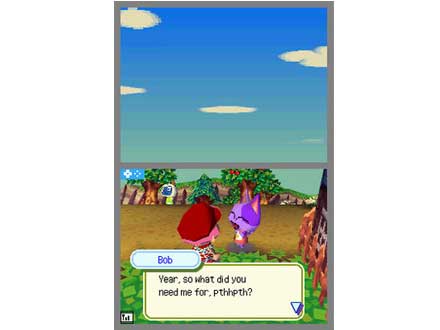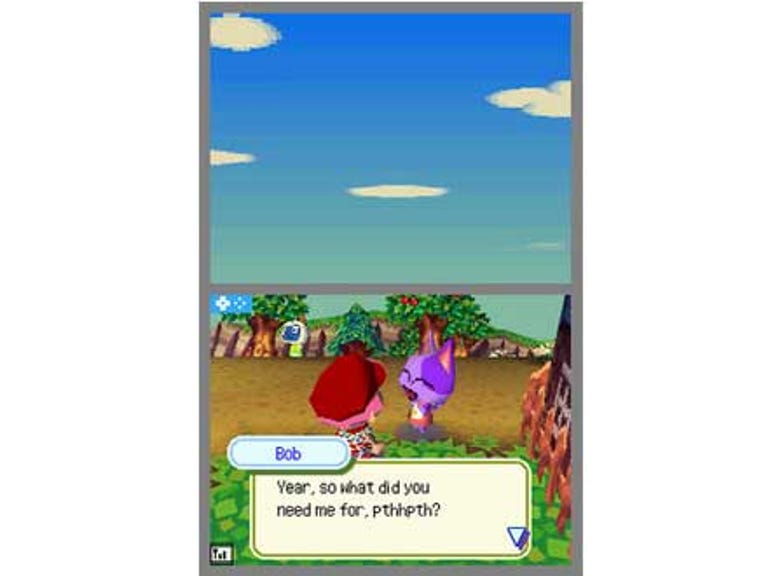 Why You Can Trust CNET
Why You Can Trust CNET Animal Crossing: Wild World review: Animal Crossing: Wild World
Wild World doesn't toy with the original Animal Crossing formula, but simply being able to take your town with you on the go makes it an easy recommendation.
The very definition of a non-game, Animal Crossing for the GameCube took gentle sprinklings of the role-playing and life-simulation genres and put them into a capriciously adorable world filled with cartoon animals -- one that you would have to live and survive in by performing what would normally look like menial labour tasks. But as uneventful as it sounds on paper, Animal Crossing was easily one of the most inexplicably fetching gaming experiences to be had on the GameCube, and it was near impossible not to be taken in by the charms of its precocious animal residents and habitual collecting mechanics.
The Good
The Bad
The Bottom Line
Now, Nintendo has brought the insidiously addictive world of Animal Crossing to the DS in the form of Animal Crossing: Wild World. This isn't a sequel; rather, this is something of a re-envisioning of the last game, with a slew of new collectibles, new characters, new tasks to perform, and some Wi-Fi and online multiplayer functionality to boot. Granted, not every single one of these additions is a slam dunk, and in fact, a few things just aren't as good as they could have been; but Wild World ultimately surpasses the last game, simply because of how much better suited its style of gameplay is for a handheld system like the DS.

The premise of Wild World is identical to that of Animal Crossing. You, a young human, are moving to a new town. You begin this game inside the cab of a salty old fellow named Kapp'n (whom fans of the first game will certainly recognise). He quizzes you on a few different things, and how you answer those questions ultimately determines your gender as well as your appearance. Once in town, you meet up with the local shop keep, Tom Nook. This industrious little raccoon turns out to be the real estate magnate of your new town, and he puts you up in some new digs, despite your lack of funds. Of course, now you're indebted to him to the tune of several thousand bells (the game's form of currency), and it's up to you to pay him back, forthwith. Animal Crossing aficionados will find this setup to be quite familiar, as they will with the events that follow. The tasks and methods for making money generally are the same, with only a few additions here and there to break things up. That's not inherently a bad thing by any means -- the system remains just as oddly compelling as it was on the GameCube.
Some of those tasks include catching fish and bugs, digging up fossils, and running errands for the local townsfolk. Fundamentally, all these things work the same as they did on the GameCube, relying on very little in the way of skill, save for the little bouts of reflexive action you'll need in the fish and bug catching. Changes are few and far between, though most of the ones made are for the better. Fossils, for instance, are much more easily identified here. Before, you'd have to send them via a letter to a far-off museum just to get them identified. Now you can simply hit up Blathers the Owl at the town museum, and he can identify them for you on the spot (he must've taken some kind of correspondence course between the first game and this one). When catching fish, you'll have to listen for a specific audio cue to pull in your line rather than relying on the rumbling of the controller to figure out when to pull back. But otherwise, everything works the same.
The thing of it is, however, that the pure mechanical busywork included in the Animal Crossing experience really isn't what makes it so appealing. These are merely means to one of several ends. The main end is the customisation of your house and character. Want a big, spinning UFO to stick in the middle of your living room? Or a complete set of orange furniture? How about a complete series of man-size (or animal-size) chess pieces? It can all be yours -- just not all at once. Only a few items are available each day, and the list changes with each passing day, thus inspiring you to check back constantly with the hope that that modern end table or rare painting you're missing is just a shop visit away. The only thing missing from the collectible items list in Wild World is the roster of classic NES games found in Animal Crossing. There are none to collect here, which is a little disappointing considering how cool it was to get those in the first game.
And that's really the beauty of Animal Crossing. This is very much the kind of game you'll want to check back with daily, simply because there's always something new to check out. Whether it's just the everyday business of shopping and collecting, or one of the many annual events that pop up, there's always something new to see. It's great, because the game uses the DS's internal clock to progress in real time. There are holidays that are based on real-life holidays, and they take place on the dates they're supposed to.
But what if you've already played Animal Crossing to death on the GameCube? Apart from more items and new characters, what does Wild World really have to offer? For one, it does include a new touch-screen-based control system -- albeit one that isn't as fleshed out as you might hope. You can use the touch screen to guide your character anywhere around the world or make them perform actions like casting a fishing line or digging a hole, and to make menu navigations and chatting a much easier task. Truthfully, the basic character controls are generally easier with the D pad and buttons.
Wild World also includes a full range of multiplayer features. The single-cart, four-player methodology from the first game is here again, though the difference is that all four players now share the same house, and the same collective debt. If you just want to visit a friend's town, you can do so in close proximity via the standard DS-to-DS connection, or you can visit a friend far away via the online Wi-Fi connectivity. The basics for both connection types remain the same. A friend can visit your town, or vice versa. While there, you and said friend can chat with one another, and do all the different things one would do in their own town. The one odd thing is that while you're in a new town or have a visitor in yours, every town resident retreats indoors. It makes them easier to find and visit with, but it's still a little peculiar.
The whole online thing might sound like the most wicked-awesome thing you've ever heard of, but there are a lot of weird restrictions to the mode. For one, you can't just visit any town with an open gate. You have to know the specific friend code of the player's town that you want to travel to, and have it on your friend list before you can go anywhere. Obviously this circumvents the unpleasant issue of jerks coming in to your town, cutting down all your trees, and writing nasty messages on your bulletin boards, but still, it's kind of lame that you can't just see all the available online towns. In fact, the only degree of randomness to be found in the multiplayer is the tag mode. Here, you'll buy a message in a bottle from Tom Nook's shop, write a letter, and release it. If you happen to be in tag mode, and someone else comes within proximity to you while they're in tag mode, your message will wash up on the shores of their town and vice versa.
If you weren't keen on the precious nature of the first game, Wild World won't do much to change your mind. But if you're one of the many who fell in love with the first game's unmistakable charms, Wild World is a world worth entering.
Keep up to date with the latest games news, reviews and features by signing up to CNET.com.au's free Games Spotlight weekly newsletter. Sign up now!
